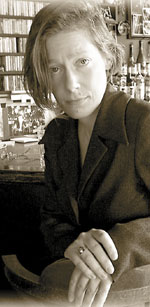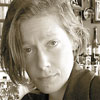
Sister Crazy
Emma Richler
Knopf Canada
$29.95
cloth
0-676-97385-X
Jemima Weiss, middle of five children, loves her family to bits. There is Ben, the eldest, who wields a “gothic imagination.” Jude, the second born, is laconic and haphazard. Gus, a younger sibling, is fragile, elegant and asthmatic, while Harriet, the youngest, is a perpetual motion machine who displays the signs and symptoms of echolalia. In Jem’s estimation, Harriet is also “synesthetic,” that is, she can taste words, feel flavours, and see letters in colours, i.e. Harriet is Sister Crazy.
With a Jewish father and Protestant mother, the Weiss family forms a distinct society, often speaking in a coded language, ingesting “curly dogs,” playing in their “bum-in-the-bag” (cul-de-sac), generally celebrating and inventing themselves as they go along.
What saves Sister Crazy from becoming a self-conscious portrait of seven eccentrics in search of a plot is the reader’s foreboding sense, confirmed in flash-forwards to hospital beds and self-inflicted wounds, that all is not well with Jemima Weiss.
Both Jem’s love and her point of view come under intense examination. They are connected, of course, like nature and nurture. Throughout the book Jem’s unadorned, chatty candour is played to a loose, carefree gait, but even in the seemingly innocuous opening sentence, Jem’s conversational innocence drops a step on the final beat:
In the elaborate Action Man games I played with my brother Jude, games sometimes lasting for days, interrupted only for school, mealtimes, and homework, and involving complex missions, actual trenches, and tiny fireworks, there would be the occasional real casualty.
The real casualty, we learn, is Jem. Battling depression, Jem’s voice changes from carefree to the clinically awkward. At last, she talks with the rigid syntax of the heavily-medicated: “I have an obsession at the moment with films involving love situations not involving a family member.” On the surface, the problem with Jem is she can’t reinvent herself outside her family. The challenge for readers is to adjust their eyes to Jem’s nature, to see it as either madness or full-blown love.
Sister Crazy was a lot of fun to read. Was it a lot of fun to write?
The process, for me, is always incredibly involving, a mix of very exhilarating and very exhausting. Yes, some parts are obviously more joyful to create than others. I find there are some surprises that are a little darker than others, and so more painful to produce than others. It ends up being equal parts of exhilaration and then collapsing on the floor in exhaustion.
Was this something you had in mind for a while, or something that just burst out of you?
I don’t sit down with a plot. This voice came to me, this character Jem, and for whatever mysterious reasons, it was very powerful to me. I wasn’t stewing for a long time about it. I actually sat down October 1, 1998 and fifteen months later I had finished.
We often talk about troubled kids from broken homes. But here you seem to make the point that a charmed childhood may be a great burden, as difficult to replace as a traumatic one is to erase.
You’re absolutely right. I think Jem is a casualty of her childhood, of her happiness. But also you have to remember that this is her voice and her vision, and we have to decide how much to trust of her. But certainly the way she sees her life, and how she grew up, and those characters, is in a very glorious light. She suffers from the matter that she can’t really adjust to the outside world as she emerges from her childhood. Nothing can measure up.
Does she simply love her family too much? Is there a clinical diagnosis, an organic root?
I always hesitate to believe in clinical diagnoses of people. I think that’s kind of an easy way out. And Jem doesn’t just slip. I think that the seed of whatever malfunction you might have, or quality of being a misfit, is always going to be there from one’s very earliest days. And the older Jem gets the more complex this becomes and the more alone she feels. I think she is capable of seeing quite clearly, but only for short periods of time. I don’t think anyone can completely support the truth for very long.
Reading reviews from Canada, the US, and the UK, do you pick up on any trends? How do different audiences respond to your book?
Two things. One is I try not to pay attention to them because my job is done. My job is writing and not to be conscious about a good or a bad review. But I have been lucky. And of course, it makes one happy.
I would imagine in Canada that people are making more parallels between your own family and the Weiss family. Is that right?
In Canada there was some of that. It’s curious, I did an awful lot of interviews, and they were as relieved to get the question over with as I was.
About your work habits: are you manic, or is it a slow, painful process?
When I’m working it seems like a 24-hour job. The shop doesn’t shut. The sitting down and actually writing takes up the least time. There’s never a moment when I’m not with it, whether it’s being woken up in the night or going on long walks across London.
Are you taking long walks these days and working on anything new?
To my surprise, when I finished Sister Crazy, I sat down and started something. I can’t imagine not working.
Any hints as to what it’s about?
It’s not science fiction, though I keep threatening my publisher.
Is there any particular novel or story or essay that your father wrote that has special meaning to you? Or one you grew up reading and thinking about more than any other?
When we were little kids we were deterred from reading them (Mordecai’s books). My parents had to take away magazines (with stories about Mordecai) so we wouldn’t become self-conscious. When we were grasping for them (his books) at about nine or ten, they were saying ‘No, not yet.’ From about ten, I began devouring them. And actually, the one I feel is the most inspired – I remember reading the first page and just sitting up, physically straightening, and I thought it was astonishing – was Barney’s Version. mRb







0 Comments